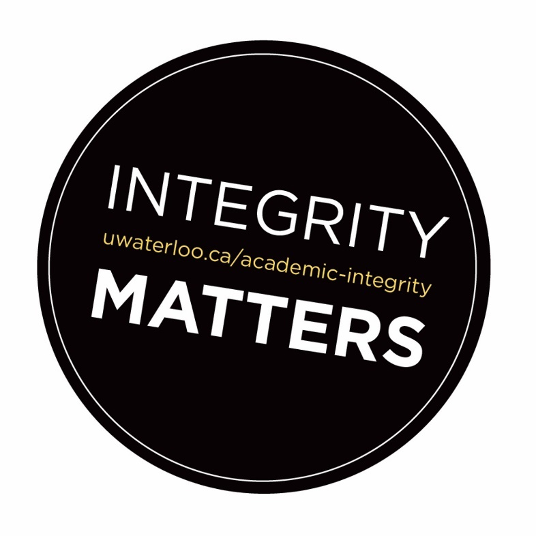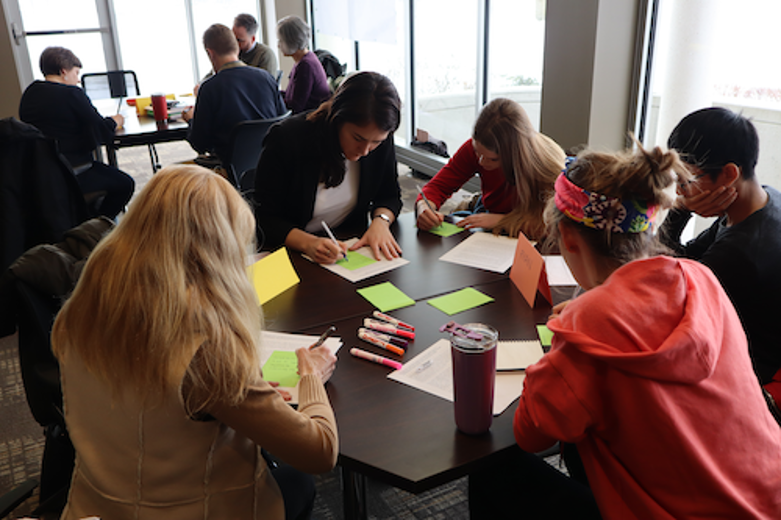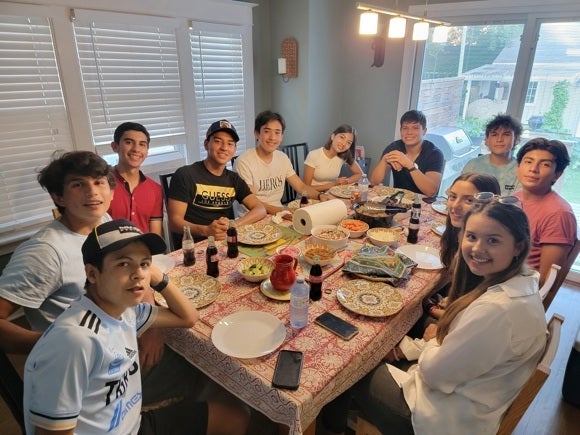Editor:
Brandon Sweet
University Communications
bulletin@uwaterloo.ca
Academic Integrity: How to support new students for success
By Amanda McKenzie.

As things ramp up for the fall term, instructors will be thinking about their upcoming classes and new students. One gap that has prevailed with students over the years is inconsistent writing and literacy skills between high school and university.
A large proportion of students moving from high school to university lack the necessary skills and knowledge for success in higher education (O’Sullivan & Dallas, 2017; Gross and Latham, 2007; Gross and Latham, 2012). Peters and Cadieux (2019) state that “There is a very large discrepancy between what the students expect to learn and what the professors think students have already learned” (pg. 6). In fact, continuing students, still struggle with these concepts and would benefit from a refresher.
These discrepancies warrant reexamining instructor expectations, and the prioritization of academic supports for students. Instructors are the primary connection to a student’s studies, and they are the most constant influence on a student’s scholarship. When an instructor explains what is meant by academic integrity, how it applies to students in their courses, and shows students where they can get writing and research support – it helps promote a culture of integrity, student development and care on campus, and sets students up for success.
To address this gap in preparation from high school to university and assist instructors in addressing it, several UW academic support units led by the SSO and OAI, including the WCC, Library, CTE, collaborated to develop an easy-to-follow guide.
Initially designed for the Faculty of Environment, the Academic Integrity Competency Resource Map includes 15 micro-competencies that were identified as being both fundamental to first-year student development as well as directly related to the maintenance of academic integrity. For each of the 15 micro-competencies, there are resources that can be easily integrated into the classroom and hyperlinked.
Use of the tool was piloted in Fall 2021 in the Faculty of Environment and a coordinated program-wide approach was taken to help identify gaps and to avoid unintentional duplication of in-class student supports. This tool provides guidance in humanities & social sciences and complements the eCampus Ontario grant work to support STEM. In addition, new academic integrity modules for students in STEM have just been released. These modules were funded by eCampus Ontario and developed by a core group of subject matter experts and instructional designers at Waterloo – with input from 6 other Ontario universities (Ottawa, Queen’s, University of Toronto – St. George, McMaster, Guelph, and Windsor).
Instructors have a huge influence on how students perceive and uphold academic integrity. Thanks for building a culture of integrity at Waterloo.
Fall cohorts now open for Mental Health Literacy Program

A message from Campus Wellness.
As we gear up for the fall term, many of us are excited to see the return of thousands of students on campus and in our classrooms. Fall is a busy time of year for students and employees, which can sometimes increase stress and anxiety. Being able to identify signs and symptoms of distress, and respond with empathy and support involves having a good level of mental health literacy.
The Mental Health Literacy (MHL) Certificate was developed to support faculty and staff to develop and practice these skills. The program is aimed at faculty and staff to encourage discussion and reflection on mental health through an equity-focused lens. Additionally, it empowers participants to build a supportive community of care, concern, and compassion. Over the course of six modules, participants will enhance their mental health literacy by increasing their competency in responding to a person in distress, accessing resources and supports, and understanding the barriers to mental health.
UWaterloo employees that have completed the program thus far find it comprehensive and easily applicable to their work. It provides a safe space for mental health conversations while prompting critical thinking about UWaterloo culture and systems. Participants will also walk away with strategies for incorporating self-care when supporting others.
For faculty and staff not able to complete the entire MHL certificate program, alternative options are available to build their capacity to support students, colleagues or family members:
- Recognizing and Responding to a Person in Distress. This is a 2.5-hour standalone offering from the MHL program
- Question, Persuade & Refer (QPR) is a 1.5-hour suicide prevention training.
If you’re interested in signing up for any of the mental health trainings, please visit the Campus Wellness training page.
Become a homestay host and begin an international adventure right in your own backyard

A message from Renison University College.
Celeste became a Host for Renison International Students after moving to Waterloo and adding a guest bedroom in the basement next to an existing bathroom - a perfect setup for hosting. Among the many benefits, according to Celeste, is integrating the hosted student into the family dynamic, finding out about their home and culture, and introducing them to Canadian culture and traditions.
"Whomever you host, they integrate into your family setting," Celeste says. "Meals are shared, activities can be planned in between daily schooling. And along the way you learn about another person’s homeland as you spend your days together. On one homestay session we introduced our student to camping. One another occasion, we included our students in Christmas celebrations complete with Christmas stockings. They were delighted to be involved in the larger family dynamic, which is almost certainly different from their own."
The program is beneficial for both student and host family, says Celeste, "You meet a need and at the same time receive the benefits of creating lasting friendships. It has been four years for us now and we still stay in touch with our very first student! The greatest and most positive benefit is the experience you receive in allowing the adventure to begin right in your own backyard or in this case, your Canadian home."
Renison’s English Language Institute is welcoming students from Tokyo Metropolitan University from August 28 to September 24, and are looking for additional members of our community who might be interested in accommodating a student for the program period. Host families will be remunerated. Please contact Scott McLeod at scott.mcleod@uwaterloo.ca for additional information.
Stormwater management ponds may not hold the solution for depleting wetlands

Relying on stormwater management (SWM) ponds to restore the depleting wetlands is not sustainable and lacks the critical ecosystem services vital for biodiversity, a new study found.
With the continued losses of wetlands projected in the near future and emphasis on the underestimation of provincial wetland loss, the study captures the contributions of SWM ponds in a changing network of water bodies and the effects of land use and land cover in this change.
Waterloo researchers led by Waverley Birch examined wetland loss, SWM pond creation and land use-based trends in seven southern Ontario municipalities within the most populated ecozones in Canada from 2002 to 2010 using a geographic information system.
“Wetland loss contributes to loss of ecosystem services in Ontario, with the likelihood of natural disasters such as droughts and floods becoming more common in urban areas,” Birch said.
For the years under study, the findings show that the total number of created SWM ponds was 1.6 times greater than the number of wetlands lost for all municipalities combined and that an overall rate of 0.13 per cent of wetland area was lost per year.
“This is concerning because of the low proportion of wetlands left in these areas and the fact that the average SWM pond was smaller than the average lost wetland, which poses a big environmental challenge,” Birch said.
The researchers argue that wetland losses will continue with trends towards their replacement by SWM ponds. They observed that losses are concentrated among wetlands that are generally not protected by provincial policies because of their small size.
“We recommend that protections be strengthened for wetlands of all sizes, in turn protecting communities by retaining the important ecosystem services that are vital for biodiversity as well as human health and wellbeing, which wetlands provide,” Birch said.
The study, authored by Waterloo’s Birch, Michael Drescher, Jeremy Pittman and Rebecca Rooney, was recently published in the Journal of Environmental Management.
Link of the day
When and Where to get support
Students can visit the Student Success Office online for supports including academic development, international student resources, immigration consulting, leadership development, exchange and study abroad, and opportunities to get involved.
Instructors looking for targeted support for developing online components for blended learning courses, transitioning remote to fully online courses, revising current online courses, and more please visit Agile Development | Centre for Extended Learning | University of Waterloo (uwaterloo.ca).
Instructors can visit the Keep Learning website to get support on adapting their teaching and learning plans for an online environment.
Course templates are available within your course in LEARN to help you build and edit your content and assignment pages quickly.
The following workshops, webinars, and events are offered by the KL team (CTE, CEL, ITMS, LIB):
-
Scholarship of Teaching and Learning (SoTL) Methods – self-directed, continuous self-enrollment course in LEARN.
-
Independent Blended Course Design (iBlend) - self-directed, continuous self-enrollment course in LEARN.
-
Copyright Overview for Waterloo Instructors and Staff - self-directed, continuous self-enrollment course in LEARN.
-
Independent Remote Course Design Essentials (iReCoDE) - self-directed, continuous self-enrollment course in LEARN.
-
Supporting Student Mental Health (for Instructors) – self-directed, continuous self-enrollment course in LEARN.
Supports are available for employees returning to campus. Visit IST’s Hybrid Work and Technology guidelines and workplace protocols to assist with the transition.
The Writing and Communication Centre has in-person and virtual services to support grad and undergrad students, postdocs and faculty with any writing or communication project. Services include one-to-one appointments, drop-ins at Dana Porter Library, online workshops, writing groups, English conversation practice, and custom in-class workshops.
Co-op students can get help finding a job and find supports to successfully work remotely, develop new skills, access wellness and career information, and contact a co-op or career advisor.
The Centre for Career Action (CCA) has services and programs to support undergrads, grad students, postdocs, alumni, and employees in figuring out what they value, what they’re good at, and how to access meaningful work, co-op, volunteer, or graduate/professional school opportunities. Questions about CCA's services? Live chat, call 519-888-4047, or stop by our front desk in the Tatham Centre 8:30 a.m. to 4:30 p.m., Monday to Friday.
Drop-in to Warrior Virtual Study Halls on Wednesdays from 5:30 p.m. to 7:00 p.m. Come together in this virtual space to set goals and work independently or in groups each week.
Renison's English Language Institute continues to offer virtual events and workshops to help students practice their English language skills.
If you feel overwhelmed or anxious and need to talk to somebody, please contact the University’s Campus Wellness services, either Health Services or Counselling Services. You can also contact the University's Centre for Mental Health Research and Treatment. Good2Talk is a post-secondary student helpline available to all students.
The Library is open with expanded hours for access to book stacks, drop-in individual study space, bookable group study rooms, drop-in access to computers and printers, book pick-up services and IST Help Desk support. Librarian consultations, Special Collections & Archives and the Geospatial Centre are available by appointment. Full details on current services and hours are available on the Library’s COVID-19 Update webpage.
The Faculty Association of the University of Waterloo (FAUW) continues to advocate for its members. Check out the FAUW blog for more information.
The University of Waterloo Staff Association (UWSA) continues to advocate for its members. Check out the UWSA blog for more information.
The Sexual Violence Prevention and Response Office (SVPRO) supports all members of the University of Waterloo campus community who have experienced, or been impacted, by sexual violence. This includes all students, staff, faculty and visitors on the main campus, the satellite campuses, and at the affiliated and federated Waterloo Institutes and Colleges. For support, email: svpro@uwaterloo.ca or visit the SVPRO website.
The Office of Indigenous Relations is a central hub that provides guidance, support, and resources to all Indigenous and non-Indigenous campus community members and oversees the University's Indigenization strategy.
The Waterloo Indigenous Student Centre, based at St. Paul’s University College, provides support and resources for Indigenous students, and educational outreach programs for the broader community, including lectures, and events.
WUSA supports for students:
Peer support - MATES, Glow Centre, RAISE, Women’s Centre - Click on one of the links to book an appointment either in person or online for the term.
Food Support Service food hampers are currently available from the Turnkey Desk 24/7 in the Student Life Centre. Drop-off locations are also open again in SLC, DC, DP, SCH, and all residences.
Co-op Connection all available online.
Centre for Academic Policy Support - CAPS is here to assist Waterloo undergraduates throughout their experience in navigating academic policy in the instances of filing petitions, grievances and appeals. Please contact them at caps@wusa.ca.
WUSA Student Legal Protection Program - Seeking legal counsel can be intimidating, especially if it’s your first time facing a legal issue. The legal assistance helpline provides quick access to legal advice in any area of law, including criminal. Just call 1-833-202-4571.
Empower Me is a confidential mental health and wellness service that connects students with qualified counsellors 24/7. They can be reached at 1-833-628-5589.
GSA-UW supports for graduate students:
The Graduate Student Association (GSA-UW) supports students’ academic and social experience and promotes their well-being.
Advising and Support - The GSA advises graduate students experiencing challenges and can help with navigating university policies & filing a grievance, appeal, or petition.
Mental Health covered by the Health Plan - The GSA Health Plan now has an 80 per cent coverage rate (up to $800/year) for Mental Health Practitioners. Your plan includes coverage for psychologists, registered social workers, psychotherapists, and clinical counselors.
Dental Care - The GSA Dental Plan covers 60 to 70 per cent of your dental costs and by visiting dental professionals who are members of the Studentcare Networks, you can receive an additional 20 to 30 per cent coverage.
Student Legal Protection Program - Your GSA fees give you access to unlimited legal advice, accessible via a toll-free helpline: +1-833-202-4571. This advice covers topics including housing disputes, employment disputes, and disputes with an academic institution.
The Graduate House: Open Monday to Tuesday 11:30 a.m. to 7:00 p.m. and Wednesday to Friday 11:30 a.m. to 9:00 p.m. We’re open to all students, faculty, staff, and community members. The Graduate House is a community space run by the GSA-UW. We’re adding new items to the menu. Graduate students who paid their fees can get discounts and free coffee.
When and Where (but mostly when)
Warriors vs. Laurier Blood Donation Battle. Join our “Waterloo Warriors” team on the Blood.ca website or app. #ItsInYouToGive
Warriors Youth Summer Day Camps, July 4 to September 2. Open to boys and girls age 5-18. Baseball, Basketball, Football, Hockey, Multi-Sport and Games & Volleyball. Register today.
Warriors Game Day Tickets and Season Passes, on sale now. Cheer on your Warriors W/M Basketball, Football W/M Hockey and W/M Volleyball teams at home during the 2022-23 season. Purchase today.
FLIGHT Virtual Summer Camp, Tuesday, August 2 to August 13. FLIGHT virtual summer camp provides a strong introduction to tech entrepreneurship to girls aged 13-18 who self-identify as Black or another underrepresented minority.
2022 Global Summit: Nanotechnology for a Healthier and Sustainable Future, Wednesday, August 10 and Thursday, August 11.
Part-Time Master of Business, Entrepreneurship and Technology Information Session, Tuesday, August 16, 4:00 p.m. to 5:00 p.m., Zoom. Registration required.